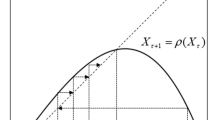Abstract
This paper introduces quasi-aggregative games and establishes conditions under which such games admit a best-reply potential. This implies existence of a pure strategy Nash equilibrium without any convexity or quasi-concavity assumptions. It also implies convergence of best-reply dynamics under some additional assumptions. Most of the existing literature’s aggregation concepts are special cases of quasi-aggregative games, and many new situations are allowed for. An example is payoff functions that depend on own strategies as well as a linear combination of the mean and the variance of players’ strategies.
Similar content being viewed by others
References
Aczél, J.: Lectures on Functional Equations and Their Applications. Dover Publications, Mineola. (Unabridged version of the original 1966 Academic Press Edition) (2006)
Agerwal R.P.: Difference Equations and Inequalities: Theory, Methods, and Applications, 2nd edn. Marcel-Dekker, New York (2000)
Alos-Ferrer C., Ania A.B.: The evolutionary stability of perfectly competitive behaviour. Econ Theory 26, 497–516 (2005)
Amir R.: Sensitivity analysis of multisector optimal economic dynamics. J Math Econ 25, 123–141 (1996)
Cornes, R., Hartley, R.: Disguised Aggregative Games, Discussion Paper 1/11. University of Nottingham (2001)
Cournot, A.: Recherches sur les Principes Mathematiques de la Theorie des Richesses, Paris: Hachette. (English translation by N. T. Bacon, Macmillan, 1897) (1838)
Dubey P., Haimanko O., Zapechelnyuk A.: Strategic complements and substitutes, and potential games. Games Econ Behav 54, 77–94 (2006)
Edlin A., Shannon C.: Strict monotonicity in comparative statics. J Econ Theory 81, 201–219 (1998)
Gordon R.A.: The integrals of Lebesgue, Denjoy, Perron, and Henstock. Am Math Soc, Providence (1994)
Gorman W.M.: The structure of utility functions. Rev Econ Stud 35, 367–390 (1968)
Huang, Z.: Fictitious play in games with a continuum of strategies, PhD Thesis, Department of Economics, State University of New York, Stony Brook (2002)
Jensen M.K.: Aggregative Games, Discussion Paper No. 06–10. University of Birmingham, Birmingham (2006)
Jensen M.K.: Monotone comparative statics in ordered vector spaces. B E J Theor Econ 7, 1 (2007a) Article 35
Jensen M.K.: Stability of pure strategy nash equilibrium in best-reply potential games. University of Birmingham, Mimeo (2007b)
Kockesen L., Ok E., Sethi R.: Evolution of interdependent preferences in aggregative games. Games Econ Behav 31, 303–310 (2000)
Kukushkin N.S.: A fixed-point theorem for decreasing mappings. Econ Lett 46, 23–26 (1994)
Kukushkin N.S.: Best response dynamics in finite games with additive aggregation. Games Econ Behav 48, 94–110 (2004)
Kukushkin N.S.: Strategic supplements in games with polylinear interactions. Russian Academy of Sciences, Mimeo (2005)
Morris S., Ui T.: Best response equivalence. Games Econ Behav 49, 260–287 (2004)
Novshek W.: On the existence of cournot equilibrium. Rev Econ Stud 52, 86–98 (1985)
Possajennikov A.: Evolutionary foundation of aggregative-taking behavior. Econ Theory 21, 921–928 (2003)
Schipper B.: The evolutionary stability of optimism, pessimism and complete ignorance. University of California at Davis, Mimeo (2005)
Topkis D.M.: Supermodularity and complementarity. Princeton University Press, New Jersey (1998)
Vind, K., Grodal, B.: Independence, Additivity, Uncertainty. Berlin: Springer (2003) (Studies in Economic Theory, vol. 14)
Voorneveld M.: Best-response potential games. Econ Lett 66, 289–295 (2000)
Author information
Authors and Affiliations
Corresponding author
Additional information
I would like to thank Daron Acemoglu, Burkhard Schipper, and an anonymous referee for their helpful remarks and comments. Thanks also to seminar participants at the University of Copenhagen and University of Warwick.
Rights and permissions
About this article
Cite this article
Jensen, M.K. Aggregative games and best-reply potentials. Econ Theory 43, 45–66 (2010). https://doi.org/10.1007/s00199-008-0419-8
Received:
Accepted:
Published:
Issue Date:
DOI: https://doi.org/10.1007/s00199-008-0419-8




